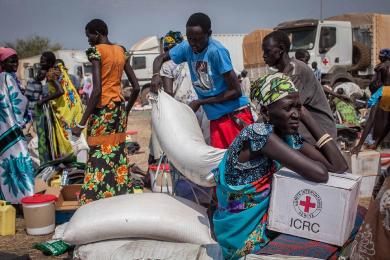Food insecurity concerns hit war-ravaged South Sudan
May 16, 2015 (JUBA) – As the South Sudanese conflict continues displacing thousands of people, food insecurity remains a serious concern, a new crop and food security report indicates.

South Sudan has been in turmoil since December 2013, when political differences within the ruling party (SPLM) plunged the country into the worst outbreak of violence since the country’s post-secession era.
The report said the world’s youngest nation made significant progress in improving food insecurity, prior to the start of the conflict in late 2013.
“However, by late 2014, about 38 per cent of the population was considered food insecure,” partly reads UNOCHA’s new report.
According to the UN mission in the country, the world body has provided protection to nearly 120,000 displaced persons in seven sites, including about 53,000 in Bentiu, 34,000 in Juba, and now nearly 29,000 in Malakal following the latest fighting in the area.
Over two million people have reportedly been displaced, 1.5 million internally, and 500,000 in neighbouring nations. Also over 2.5 million people face severe food insecurity, especially in the greater Upper Nile region.
This figure is most likely to increase significantly, OCHA anticipated in the report.
The report anticipates that displaced population will depend mainly on food assistance and only to some extent on market supplies.
“As agriculture remains highly vulnerable to adverse weather conditions and insecurity, recovery will remain fragile unless market functionality and supply of food commodities improve significantly during 2015,” stressed OCHA’s report.
The report further pointed that the generally favourable rains and the absence of major outbreaks of pests and disease supported the cereal crop production in the traditional farming sector in 2014.
“The overall deficit until the next harvest in late 2015 is estimated at nearly 249,000 tonnes,” it revealed.
Meanwhile, the world body and its partners are reportedly aiming to support 2.8 million people with livelihood support throughout South Sudan in 2015 by providing a combination of vegetable, crop and fishing kits, as well as other kinds of support.
(ST)
